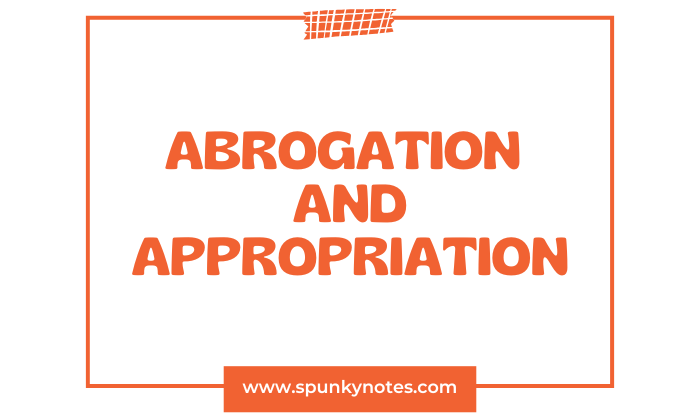

Estimated Reading Time: 7 min
In postcolonial literature, writers from formerly colonized societies use abrogation and appropriation to reshape language and resist colonial influence.
These strategies help writers to reject the dominance of colonial powers (the “Center”) and reclaim control over their cultural identity.
These strategies helped in “striking back” at the colonial powers, often called the “Center,” by reshaping the received language—often English.
Abrogation
Abrogation is a concept in postcolonial literature where writers reject the idea of a “correct” or “standard” English. This “standard” English is often promoted by dominant classes or groups, especially those from colonial powers.
By dismissing this idea, abrogation refuses to view local dialects and cultural language variations as inferior or “incorrect.” Instead, it values the unique expressions and languages of colonized societies.
In postcolonial studies, abrogation often works alongside appropriation. While abrogation involves rejecting the colonial “correct” English, appropriation is the process of reshaping English to express native cultural ideas and experiences.
These strategies allow postcolonial writers to create works that feel true to their identities and cultures. They reshape English to reflect local expressions, proverbs, idioms, and cultural beliefs.
Abrogation has a strong political stance. It challenges the colonial mindset that only one form of English is valid, questioning the idea that colonial English is the “correct” form.
Abrogation asserts that all forms of English, whether local dialects or variations, are equally valid. This approach challenges the belief that using the colonizer’s language keeps people within the colonial idea.
It is often summarized by the saying,
You can’t dismantle the master’s house with the master’s tools.
Instead, abrogation suggests that language is flexible. The “master’s tools” can be transformed to fit local realities, offering a path to cultural expression and even liberation.
Abrogation is not only about language. It can also be used in other cultural and political areas, such as film, theater, history, and politics.
For example, abrogation can be seen when postcolonial filmmakers reject Western storytelling norms and focus on local narratives. In education, abrogation may involve teaching styles and content that reflect native cultures instead of strictly following colonial standards.
Abrogation allows individuals in postcolonial societies to reclaim their cultural space by redefining “correct” practices. It shows that there is no single “right” way of expression, whether in language, art, or thought.
Therefore, abrogation becomes a powerful tool for postcolonial communities to assert their own identity, history, and values while breaking away from colonial definitions and limitations.
Examples of Abrogation
Deviation from Standard English Syntax and Grammar
Arundhati Roy frequently deviates from standard English by using unconventional sentence structures, fragmented language, and atypical punctuation.
For example, phrases like “It’s best to be prepared” and “Anything can happen to anyone” reflect a vernacular structure. These sentences often lack traditional subjects or are structured ungrammatically, rejecting the rigidity of colonial English.
Use of Local Dialects and Expressions
Roy incorporates untranslated Malayalam words, such as “ammo” (meaning “oh no”) and “kando” (meaning “did you see?”), without explanation.
This use of untranslated words forces readers unfamiliar with Malayalam to navigate Indian expressions, resisting colonial English norms that expect universal comprehension.
By doing this, she places Indian culture at the forefront and makes the language feel distinctly Indian.
Non-Standard Capitalization and Spelling
Roy often capitalizes words that are typically lowercase to emphasize cultural concepts and expressions. For instance, she writes phrases like “They’re a Family” or “History House” in ways that deviate from standard capitalization.
This approach challenges traditional English conventions and reflects her intent to prioritize Indian terms and ideas, displacing colonial norms with a localized narrative style.
Appropriation
Appropriation refers to how postcolonial societies adapt aspects of colonial culture, including language, literary forms, and modes of thought, to reflect their own (colonized) cultural identities.
This adaptation involves using the tools and forms of colonial powers to communicate and assert postcolonial cultural experiences, thereby subverting the original colonial intent.
Appropriation of Language and Form
Appropriation is especially significant in language and writing forms in postcolonial literature. Writers use colonial languages to express the unique social and cultural experiences of postcolonial societies.
They reshape these languages, adding local expressions, customs, and idioms to make them relevant to their communities.
For example, Chinua Achebe famously stated, quoting James Baldwin, that a colonial language could “bear the burden of another experience.”
This concept emphasizes that English or other colonial languages can be transformed to reflect native identities. Using English, Achebe reaches a broad audience while simultaneously asserting his Nigerian culture.
Examples of Appropriation
Blending of Indian Cultural Terms with English Syntax
Roy uses English syntax but blends it with Malayalam terms and Indian cultural references, creating a hybridized language
For example, she refers to “Kathakali dances” and “Parathas” within English sentences, seamlessly integrating Indian cultural markers.
This technique allows her to use English to communicate her Indian experiences, making the language reflect her cultural background.
Inventing New Compound Words
Roy frequently constructs compound words like “Orangedrink Lemondrink Man” to describe characters. This technique is based on local terminology and the way people identify individuals through products or professions in everyday speech.
By blending terms into single descriptors, she adapts English to mirror common naming conventions in Indian society.
Mixing English with Regional Syntax
Arundhati Roy mimics the syntax of Indian English speakers, as seen in phrases like “Not old. Not young. But a viable die-able age.”
By doing so, she captures the rhythm and cadence of Indian English, reshaping the colonial language to reflect the voices of her characters and their cultural identities.
This appropriation allows English to serve as a bridge between local speech and colonial language.
Appropriation Versus Rejection
The use of colonial languages remains a complex choice. Some writers, like Ngũgĩ wa Thiong’o, oppose writing in colonial languages, arguing that it benefits only the educated elite and mostly reaches an audience outside the native community.
Ngũgĩ ultimately chose to write in Gikuyu, his native language, to preserve his cultural heritage and make his work accessible to his own people.
However, Ngũgĩ used the Western novel form, demonstrating that appropriation can also include adapting forms of colonial literature.
His reputation as an English writer helped him gain recognition for his Gikuyu works, illustrating the relationship between language and cultural resistance.
Postcolonial Resistance through Appropriation
Postcolonial writers can communicate their cultural experiences and intervene in the dominant discourse by appropriating colonial language and discursive forms.
For example, Caribbean and African writers might adapt the English novel form, including local dialects, to reflect their communities’ lives. This allows them to share their cultural realities with an international audience.
Translation
Appropriation also emphasizes the importance of translation, promoting understanding between indigenous languages and English, as well as between different indigenous languages.
Postcolonial scholars argue that educational institutions in former colonial centres should encourage learning Indigenous languages, making postcolonial works accessible to readers.
By appropriating and reshaping the colonial language, postcolonial writers create powerful expressions of identity and resistance, showing that language is a flexible tool that can serve the purposes of its speakers, regardless of its colonial origins.
Differences Between Abrogation and Appropriation
Definition
Abrogation rejects the standards and norms of colonial language, resisting its “correct” forms.
Appropriation, on the other hand, adapts the colonial language to express local culture and identity.
Purpose
Abrogation challenges the authority of colonial language by refusing to accept its imposed rules.
Appropriation transforms the colonial language, making it a tool to convey postcolonial cultural experiences.
Method
Abrogation involves disregarding colonial language rules, using native dialects, expressions, and unstructured syntax.
In contrast, appropriation blends local vocabulary, idioms, and cultural elements within colonial language to create a hybrid.
View on Colonial Language
Abrogation sees colonial language norms as restrictive, while appropriation views colonial language as adaptable and useful for reaching wider audiences.
Result
Abrogation highlights the validity of native languages, rejecting conformity to colonial standards.
Appropriation, however, creates a blended language that combines colonial and local cultural elements.
Effect on Identity
Abrogation asserts cultural independence by rejecting colonial norms and valuing native cultural integrity.
Appropriation uses the colonial language itself to convey native identity, making it accessible to a global audience.
Application Beyond Language
Abrogation can apply to other areas, such as theater, politics, and education, where “standard” colonial practices are rejected.
Appropriation, meanwhile, adapts colonial forms like the novel structure, including local elements in postcolonial literature and art.


